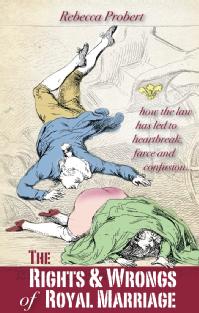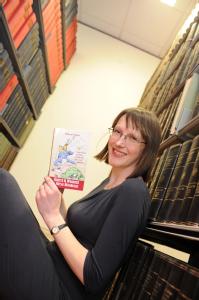Study says William and Kate could be the last royal wedding without major legal complications
UK royal marriage law is now in its most confused state for centuries, and Prince William and Kate Middleton’s could be the last royal wedding not to face major legal complications, according to new research published this week by Professor Rebecca Probert of the University of Warwick’s School of Law.
Professor Probert, an expert in current and historical marriage law at the University of Warwick says:
“The laws which regulate royal marriage are not fit for purpose in the twenty-first century, an age when human rights and free choice are valued. Files in the National Archives show that previous governments have been aware of all of these problems and absurdities of royal marriage law, but have left them for future generations to tackle. It’s only through good luck, rather than good law, that William and Kate’s wedding is free of these issues - this could be the last royal wedding to avoid major legal complications if the law is not resolved.”
Professor Probert’s research has just been published in a book entitled The Rights and Wrongs of Royal Marriage : How the Law Has Led to Heartbreak, Farce and Confusion, and Why it Must be Changed It outlines the contradictory legislative and legal mess that constitutes the last 300 years of Royal marriage law, and how that mess potentially became ten times worse when it was brought into shuddering contact with the Human Rights Act as a consequence of the wedding of Charles and Camilla.
As Professor Probert says:
“Nobody knows for sure how the Human Rights Act might apply to the rest of the law on royal marriage. Strasbourg judges might decide that it is discriminatory for royals to be unable to marry without the Queen’s consent, or to have to choose between love, religious faith and duty.”
Her book sets out a number of problems, loose ends and absurdities that now haunt royal marriage because of this legal tangle.
A list of ten of those absurdities and problems now follows:
- A future heir to the throne could enter into a same-sex partnership - or cohabit - with a Catholic, and still succeed to the throne.
- Royals do not need the Queen’s consent to enter into a same-sex partnership, but do need her consent to marry.
- The law has become so confused that no one can agree on how many people need the Queen’s consent to marry - it might be just a handful of aristocrats in Scotland and Germany, or an unknown number of people throughout the world who can trace their descent from King George II. People who have no idea that they need the Queen’s consent to marry might nevertheless find that their marriage is technically void in UK law.
- If the Act of Settlement still holds as law then any future heir to the throne would still become monarch whether they married a Muslim or a Methodist, a Scientologist or a Satanist, but they would be barred from the throne if they married a Roman Catholic.
- However a royal married to somebody who converts to Catholicism after the wedding can still succeed to the throne, so long as the spouse is not a Catholic when they say ‘I do’.
- Before Charles and Camilla’s wedding in 2005, it was understood that royals could not marry in a civil register office. The then Government suggested that they could, since the Human Rights Act meant they were entitled to the same access to civil ceremonies as their subjects. If that is the case, royals could now equally assert their human right to marry a Roman Catholic thus pushing aside the Act of Settlement and potentially leading to a Catholic queen or consort for the first time in over three centuries.
- If the Human Rights Act means royals have the same marriage rights as everyone else, their weddings must also be subject to the same rules. Anyone conducting a royal wedding in future would be obliged to ensure the royals sign not just the royal marriage register but also the appropriate parish or civil register. Even the Archbishop of Canterbury could face a £1000 fine if he failed to ensure that this was done.
- Claiming rights on the basis of non-discrimination must also inevitably mean forfeiting privileges enjoyed since the eighteenth century, with implications for the validity of future royal marriages. If William and Kate had not correctly observed the calling of the banns or the obtaining of a licence, their marriage might not be valid.
- The combined effects of the legislation governing royal marriage (the Princess Sophia Naturalization Act 1705 and the Royal Marriages Act 1772) - are so unclear that in 1957 it was realised that the Duke of Edinburgh himself could be illegitimate. The Prime Minister, Harold Macmillan, considered that it was best to let sleeping dogs lie: the doubts were never revealed and the law was never clarified.
- ‘Top secret’ files dating from the 1950s in the National Archives show that the government of the day knew that Princess Margaret could actually have married Peter Townsend without the Queen’s consent while nevertheless retaining her royal title and her place in the succession.
Note for editors: The Rights & Wrongs of Royal Marriage: How the Law Has Led to Heartbreak, Farce and Confusion, and Why it Must be Changed by Professor Rebecca Probert is published by Takeaway Press ISBN-10: 0956384730, ISBN-13: 978-0956384737 more detail at http://amzn.to/hvJcJy
For further information please contact:
Professor Rebecca Probert, School of Law,
University of Warwick Tel: +44 (0)2476 524484
Email: Rebecca.Probert@warwick.ac.uk 
Peter Dunn, Head of Communications
Communications Office, University House,
University of Warwick, Coventry, CV4 8UW, United Kingdom
email: p.j.dunn@warwick.ac.uk
Tel: +44 (0)24 76 523708 Mobile/Cell: +44 (0)7767 655860
PR25 18th March 2011


